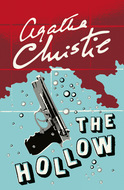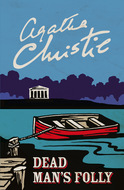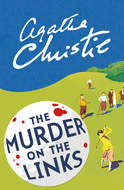Książki nie można pobrać jako pliku, ale można ją czytać w naszej aplikacji lub online na stronie.
Czytaj książkę: «Evil Under the Sun»
EVIL UNDER THE SUN
Agatha Christie

Copyright
HarperCollinsPublishers
1 London Bridge Street
London SE1 9GF
First published in Great Britain by Collins, The Crime Club 1941
The AC Monogram Logo and the Poirot Icon are trade marks and AGATHA CHRISTIE, POIROT and the Agatha Christie Signature are registered trademarks of Agatha Christie Limited in the UK and elsewhere. Copyright © Agatha Christie Limited 1941. All rights reserved.
Cover design by Holly McDonald © HarperCollinsPublishers Ltd 2019
Cover photograph © Dragon Todorovic/Trevillion Images
Agatha Christie asserts the moral right to be identified as the author of this work.
A catalogue copy of this book is available from the British Library.
This novel is entirely a work of fiction. The names, characters and incidents portrayed in it are the work of the author’s imagination. Any resemblance to actual persons, living or dead, events or localities is entirely coincidental.
All rights reserved under International and Pan-American Copyright Conventions. By payment of the required fees, you have been granted the non-exclusive, non-transferable right to access and read the text of this e-book on screen. No part of this text may be reproduced, transmitted, down-loaded, decompiled, reverse engineered, or stored in or introduced into any information storage and retrieval system, in any form or by any means, whether electronic or mechanical, now known or hereinafter invented, without the express written permission of HarperCollins.
Source ISBN: 9780008362812
Ebook Edition © 2019 ISBN: 9780007422333
Version: 2019-07-23
Dedication
TO JOHN
In memory of our last season in Syria
Contents
Cover
Title Page
Copyright
Dedication
Map
Chapter 1
Chapter 2
Chapter 3
Chapter 4
Chapter 5
Chapter 6
Chapter 7
Chapter 8
Chapter 9
Chapter 10
Chapter 11
Chapter 12
Chapter 13
If you enjoyed this book why not try: And Then There Were None
The Agatha Christie Collection
About the Publisher
Map

CHAPTER 1
When Captain Roger Angmering built himself a house in the year 1782 on the island off Leathercombe Bay, it was thought the height of eccentricity on his part. A man of good family such as he was should have had a decorous mansion set in wide meadows with, perhaps, a running stream and good pasture.
But Captain Roger Angmering had only one great love, the sea. So he built his house—a sturdy house too, as it needed to be, on the little windswept gull-haunted promontory—cut off from land at each high tide.
He did not marry, the sea was his first and last spouse, and at his death the house and island went to a distant cousin. That cousin and his descendants thought little of the bequest. Their own acres dwindled, and their heirs grew steadily poorer.
In 1922 when the great cult of the Seaside for Holidays was finally established and the coast of Devon and Cornwall was no longer thought too hot in the summer, Arthur Angmering found his vast inconvenient late Georgian house unsaleable, but he got a good price for the odd bit of property acquired by the seafaring Captain Roger.
The sturdy house was added to and embellished. A concrete causeway was laid down from the mainland to the island. ‘Walks’ and ‘Nooks’ were cut and devised all round the island. There were two tennis courts, sun-terraces leading down to a little bay embellished with rafts and diving boards. The Jolly Roger Hotel, Smugglers’ Island, Leathercombe Bay, came triumphantly into being. And from June till September (with a short season at Easter) the Jolly Roger Hotel was usually packed to the attics. It was enlarged and improved in 1934 by the addition of a cocktail bar, a bigger dining-room and some extra bathrooms. The prices went up.
People said:
‘Ever been to Leathercombe Bay? Awfully jolly hotel there, on a sort of island. Very comfortable and no trippers or charabancs. Good cooking and all that. You ought to go.’
And people did go.
II
There was one very important person (in his own estimation at least) staying at the Jolly Roger. Hercule Poirot, resplendent in a white duck suit, with a panama hat tilted over his eyes, his moustaches magnificently befurled, lay back in an improved type of deck chair and surveyed the bathing beach. A series of terraces led down to it from the hotel. On the beach itself were floats, lilos, rubber and canvas boats, balls and rubber toys. There was a long springboard and three rafts at varying distances from the shore.
Of the bathers, some were in the sea, some were lying stretched out in the sun, and some were anointing themselves carefully with oil.
On the terrace immediately above, the non-bathers sat and commented on the weather, the scene in front of them, the news in the morning papers and any other subject that appealed to them.
On Poirot’s left a ceaseless flow of conversation poured in a gentle monotone from the lips of Mrs Gardener while at the same time her needles clacked as she knitted vigorously. Beyond her, her husband, Odell C. Gardener, lay in a hammock chair, his hat tilted forward over his nose, and occasionally uttered a brief statement when called upon to do so.
On Poirot’s right, Miss Brewster, a tough athletic woman with grizzled hair and a pleasant weather-beaten face, made gruff comments. The result sounded rather like a sheepdog whose short stentorian barks interrupted the ceaseless yapping of a Pomeranian.
Mrs Gardener was saying:
‘And so I said to Mr Gardener, why, I said, sightseeing is all very well, and I do like to do a place thoroughly. But, after all, I said, we’ve done England pretty well and all I want now is to get to some quiet spot by the seaside and just relax. That’s what I said, wasn’t it, Odell? Just relax. I feel I must relax, I said. That’s so, isn’t it, Odell?’
Mr Gardener, from behind his hat, murmured:
‘Yes, darling.’
Mrs Gardener pursued the theme.
‘And so, when I mentioned it to Mr Kelso, at Cook’s—He’s arranged all our itinerary for us and been most helpful in every way. I don’t really know what we’d have done without him!—well, as I say, when I mentioned it to him, Mr Kelso said that we couldn’t do better than come here. A most picturesque spot, he said, quite out of the world, and at the same time very comfortable and most exclusive in every way. And, of course, Mr Gardener, he chipped in there and said what about the sanitary arrangements? Because, if you’ll believe me M. Poirot, a sister of Mr Gardener’s went to stay at a guesthouse once, very exclusive they said it was, and in the heart of the moors, but would you believe me, nothing but an earth closet! So naturally that made Mr Gardener suspicious of these out-of-the-world places, didn’t it, Odell?’
‘Why, yes, darling,’ said Gardener.
‘But Mr Kelso reassured us at once. The sanitation, he said, was absolutely the latest word, and the cooking was excellent. And I’m sure that’s so. And what I like about it is, it’s intime, if you know what I mean. Being a small place we all talk to each other and everybody knows everybody. If there is a fault about the British it is that they’re inclined to be a bit standoffish until they’ve known you a couple of years. After that nobody could be nicer. Mr Kelso said that interesting people came here, and I see he was right. There’s you M. Poirot, and Miss Darnley. Oh! I was just tickled to death when I found out who you were, wasn’t I, Odell?’
‘You were, darling.’
‘Ha!’ said Miss Brewster, breaking in explosively. ‘What a thrill, eh, M. Poirot?’
Hercule Poirot raised his hands in deprecation. But it was no more than a polite gesture. Mrs Gardener flowed smoothly on.
‘You see, M. Poirot, I’d heard a lot about you from Cornelia Robson who was. Mr Gardener and I were at Badenhof in May. And of course Cornelia told us all about that business in Egypt when Linnet Ridgeway was killed. She said you were wonderful and I’ve always been simply crazy to meet you, haven’t I, Odell?’
‘Yes, darling.’
‘And then Miss Darnley, too. I get a lot of my things at Rose Mond’s and of course she is Rose Mond, isn’t she? I think her clothes are ever so clever. Such a marvellous line. That dress I had on last night was one of hers. She’s just a lovely woman in every way, I think.’
From beyond Miss Brewster, Major Barry, who had been sitting with protuberant eyes glued to the bathers, grunted out:
‘Distinguished lookin’ gal!’
Mrs Gardener clacked her needles.
‘I’ve just got to confess one thing, M. Poirot. It gave me a kind of a turn meeting you here—not that I wasn’t just thrilled to meet you, because I was. Mr Gardener knows that. But it just came to me that you might be here—well, professionally. You know what I mean? Well, I’m just terribly sensitive, as Mr Gardener will tell you, and I just couldn’t bear it if I was to be mixed up in crime of any kind. You see—’
Mr Gardener cleared his throat. He said:
‘You see, M. Poirot, Mrs Gardener is very sensitive.’
The hands of Hercule Poirot shot into the air.
‘But let me assure you, Madame, that I am here simply in the same way that you are here yourselves—to enjoy myself—to spend the holiday. I do not think of crime even.’
Miss Brewster said again, giving her short gruff bark:
‘No bodies on Smugglers’ Island.’
Hercule Poirot said:
‘Ah! but that, it is not strictly true.’ He pointed downward. ‘Regard them there, lying out in rows. What are they? They are not men and women. There is nothing personal about them. They are just—bodies!’
Major Barry said appreciatively:
‘Good-looking fillies, some of ’em. Bit on the thin side, perhaps.’
Poirot cried:
‘Yes, but what appeal is there? What mystery? I, I am old, of the old school, When I was young, one saw barely the ankle. The glimpse of a foamy petticoat, how alluring! The gentle swelling of the calf—a knee—a beribboned garter—’
‘Naughty, naughty!’ said Major Barry hoarsely.
‘Much more sensible—the things we wear nowadays,’ said Miss Brewster.
‘Why, yes, M. Poirot,’ said Mrs Gardener. ‘I do think, you know, that our girls and boys nowadays lead a much more natural healthy life. They just romp about together and they—well, they—’ Mrs Gardener blushed slightly, for she had a nice mind—‘they think nothing of it, if you know what I mean?’
‘I do know,’ said Hercule Poirot. ‘It is deplorable!’
‘Deplorable?’ squeaked Mrs Gardener.
‘To remove all the romance—all the mystery! Today everything is standardized!’ He waved a hand towards the recumbent figures. ‘That reminds me very much of the Morgue in Paris.’
‘M. Poirot!’ Mrs Gardener was scandalized.
‘Bodies—arranged on slabs—like butcher’s meat!’
‘But M. Poirot, isn’t that too far-fetched for words?’
Hercule Poirot admitted:
‘It may be, yes.’
‘All the same,’ Mrs Gardener knitted with energy, ‘I’m inclined to agree with you on one point. These girls that lie out like that in the sun will grow hair on their legs and arms. I’ve said so to Irene—that’s my daughter, M. Poirot. Irene, I said to her, if you lie out like that in the sun, you’ll have hair all over you, hair on your arms and hair on your legs and hair on your bosom, and what will you look like then? I said to her. Didn’t I, Odell?’
‘Yes, darling,’ said Mr Gardener.
Everyone was silent, perhaps making a mental picture of Irene when the worst had happened.
Mrs Gardener rolled up her knitting and said:
‘I wonder now—’
Mr Gardener said:
‘Yes, darling?’
He struggled out of the hammock chair and took Mrs Gardener’s knitting and her book. He asked:
‘What about joining us for a drink, Miss Brewster?’
‘Not just now, thanks.’
The Gardeners went up to the hotel.
Miss Brewster said:
‘American husbands are wonderful!’
III
Mrs Gardener’s place was taken by the Reverend Stephen Lane.
Mr Lane was a tall vigorous clergyman of fifty-odd. His face was tanned and his dark grey flannel trousers were holidayfied and disreputable.
He said with enthusiasm:
‘Marvellous country! I’ve been from Leathercombe Bay to Harford and back over the cliffs.’
‘Warm work walking today,’ said Major Barry, who never walked.
‘Good exercise,’ said Miss Brewster. ‘I haven’t been for my row yet. Nothing like rowing for your stomach muscles.’
The eyes of Hercule Poirot dropped somewhat ruefully to a certain protuberance in his middle.
Miss Brewster, noting the glance, said kindly:
‘You’d soon get that off, M. Poirot, if you took a rowing boat out every day.’
‘Merci, Mademoiselle. I detest boats!’
‘You mean small boats?’
‘Boats of all sizes!’ He closed his eyes and shuddered. ‘The movement of the sea, it is not pleasant.’
‘Bless the man, the sea is as calm as a mill pond today.’
Poirot replied with conviction:
‘There is no such thing as a really calm sea. Always, always, there is motion.’
‘If you ask me,’ said Major Barry, ‘seasickness is nine-tenths nerves.’
‘There,’ said the clergyman, smiling a little, ‘speaks the good sailor—eh, Major?’
‘Only been ill once—and that was crossing the Channel! Don’t think about it, that’s my motto.’
‘Seasickness is really a very odd thing,’ mused Miss Brewster. ‘Why should some people be subject to it and not others? It seems so unfair. And nothing to do with one’s ordinary health. Quite sickly people are good sailors. Someone told me once it was something to do with one’s spine. Then there’s the way some people can’t stand heights. I’m not very good myself, but Mrs Redfern is far worse. The other day, on the cliff path to Harford, she turned quite giddy and simply clung to me. She told me she once got stuck halfway down that outside staircase on Milan Cathedral. She’d gone up without thinking but coming down did for her.’
‘She’d better not go down the ladder to Pixy Cove, then,’ observed Lane.
Miss Brewster made a face.
‘I funk that myself. It’s all right for the young. The Cowan boys and the young Mastermans, they run up and down and enjoy it.’
Lane said:
‘Here comes Mrs Redfern now, coming up from her bathe.’
Miss Brewster remarked:
‘M. Poirot ought to approve of her. She’s no sunbather.’
Young Mrs Redfern had taken off her rubber cap and was shaking out her hair. She was an ash blonde and her skin was of that dead fairness that goes with that colouring. Her legs and arms were very white.
With a hoarse chuckle, Major Barry said:
‘Looks a bit uncooked among the others, doesn’t she?’
Wrapping herself in a long bathrobe Christine Redfern came up the beach and mounted the steps towards them.
She had a fair serious face, pretty in a negative way, and small dainty hands and feet.
She smiled at them and dropped down beside them, tucking her bath-wrap round her.
Miss Brewster said:
‘You have earned M. Poirot’s good opinion. He doesn’t like the sun-tanning crowd. Says they’re like joints of butcher’s meat, or words to that effect.’
Christine Redfern smiled ruefully. She said:
‘I wish I could sunbathe! But I don’t go brown. I only blister and get the most frightful freckles all over my arms.’
‘Better than getting hair all over them like Mrs Gardener’s Irene,’ said Miss Brewster. In answer to Christine’s enquiring glance she went on: ‘Mrs Gardener’s been in grand form this morning. Absolutely non-stop. “Isn’t that so, Odell?” “Yes, darling.”’ She paused and then said: ‘I wish, though, M. Poirot, that you’d played up to her a bit. Why didn’t you? Why didn’t you tell her that you were down here investigating a particularly gruesome murder, and that the murderer, a homicidal maniac, was certainly to be found among the guests of the hotel?’
Hercule Poirot sighed. He said:
‘I very much fear she would have believed me.’
Major Barry gave a wheezy chuckle. He said:
‘She certainly would.’
Emily Brewster said:
‘No, I don’t believe even Mrs Gardener would have believed in a crime staged here. This isn’t the sort of place you’d get a body!’
Hercule Poirot stirred a little in his chair. He protested. He said:
‘But why not, Mademoiselle? Why should there not be what you call a “body” here on Smugglers’ Island?’
Emily Brewster said:
‘I don’t know. I suppose some places are more unlikely than others. This isn’t the kind of spot—’ She broke off, finding it difficult to explain her meaning.
‘It is romantic, yes,’ agreed Hercule Poirot. ‘It is peaceful. The sun shines. The sea is blue. But you forget, Miss Brewster, there is evil everywhere under the sun.’
The clergyman stirred in his chair. He leaned forward. His intensely blue eyes lighted up.
Miss Brewster shrugged her shoulders.
‘Oh! of course I realize that, but all the same—’
‘But all the same this still seems to you an unlikely setting for crime? You forget one thing, Mademoiselle.’
‘Human nature, I suppose?’
‘That, yes. That, always. But that was not what I was going to say. I was going to point out to you that here everyone is on holiday.’
Emily Brewster turned a puzzled face to him.
‘I don’t understand.’
Hercule Poirot beamed kindly at her. He made dabs in the air with an emphatic forefinger.
‘Let us say, you have an enemy. If you seek him out in his flat, in his office, in the street—eh bien, you must have a reason—you must account for yourself. But here at the seaside it is necessary for no one to account for himself. You are at Leathercombe Bay, why? Parbleu! it is August—one goes to the seaside in August—one is on one’s holiday. It is quite natural, you see, for you to be here and for Mr Lane to be here and for Major Barry to be here and for Mrs Redfern and her husband to be here. Because it is the custom in England to go to the seaside in August.’
‘Well,’ admitted Miss Brewster, ‘that’s certainly a very ingenious idea. But what about the Gardeners? They’re American.’
Poirot smiled.
‘Even Mrs Gardener, as she told us, feels the need to relax. Also, since she is “doing” England, she must certainly spend a fortnight at the seaside—as a good tourist, if nothing else. She enjoys watching people.’
Mrs Redfern murmured:
‘You like watching the people too, I think?’
‘Madame, I will confess it. I do.’
She said thoughtfully: ‘You see—a good deal.’
IV
There was a pause. Stephen Lane cleared his throat and said with a trace of self-consciousness.
‘I was interested, M. Poirot, in something you said just now. You said that there was evil done everywhere under the sun. It was almost a quotation from Ecclesiastes.’ He paused and then quoted himself: ‘Yea, also the heart of the sons of men is full of evil, and madness is in their heart while they live.’ His face lit up with an almost fanatical light. ‘I was glad to hear you say that. Nowadays, no one believes in evil. It is considered, at most, a mere negation of good. Evil, people say, is done by those who know no better—who are undeveloped—who are to be pitied rather than blamed. But M. Poirot, evil is real! It is a fact! I believe in Evil like I believe in Good. It exists! It is powerful! It walks the earth!’
He stopped. His breath was coming fast. He wiped his forehead with his handkerchief and looked suddenly apologetic.
‘I’m sorry. I got carried away.’
Poirot said calmly:
‘I understand your meaning. Up to a point I agree with you. Evil does walk the earth and can be recognized as such.’
Major Barry cleared his throat.
‘Talking of that sort of thing, some of these fakir fellers in India—’
Major Barry had been long enough at the Jolly Roger for everyone to be on their guard against his fatal tendency to embark on long Indian stories. Both Miss Brewster and Mrs Redfern burst into speech.
‘That’s your husband swimming in now, isn’t it, Mrs Redfern? How magnificent his crawl stroke is. He’s an awfully good swimmer.’
At the same moment Mrs Redfern said:
‘Oh look! What a lovely little boat that is out there with the red sails. It’s Mr Blatt’s, isn’t it?’
The sailing boat with the red sails was just crossing the end of the bay.
Major Barry grunted:
‘Fanciful idea, red sails,’ but the menace of the story about the fakir was avoided.
Hercule Poirot looked with appreciation at the young man who had just swum to shore. Patrick Redfern was a good specimen of humanity. Lean, bronzed, with broad shoulders and narrow thighs, there was about him a kind of infectious enjoyment and gaiety—a native simplicity that endeared him to all women and most men.
He stood there shaking the water from him and raising a hand in gay salutation to his wife.
She waved back calling out:
‘Come up here, Pat.’
‘I’m coming.’
He went a little way along the beach to retrieve the towel he had left there.
It was then that a woman came down past them from the hotel to the beach.
Her arrival had all the importance of a stage entrance.
Moreover, she walked as though she knew it. There was no self-consciousness apparent. It would seem that she was too used to the invariable effect her presence produced.
She was tall and slender. She wore a simple backless white bathing dress and every inch of her exposed body was tanned a beautiful even shade of bronze. She was as perfect as a statue. Her hair was a rich flaming auburn curling richly and intimately into her neck. Her face had that slight hardness which is seen when thirty years have come and gone, but the whole effect of her was one of youth—of superb and triumphant vitality. There was a Chinese immobility about her face, and an upward slant of the dark blue eyes. On her head she wore a fantastic Chinese hat of jade green cardboard.
There was that about her which made every other woman on the beach seem faded and insignificant. And with equal inevitability, the eye of every male present was drawn and riveted on her.
The eyes of Hercule Poirot opened, his moustache quivered appreciatively, Major Barry sat up and his protuberant eyes bulged even farther with excitement; on Poirot’s left the Reverend Stephen Lane drew in his breath with a little hiss and his figure stiffened.
Major Barry said in a hoarse whisper:
‘Arlena Stuart (that’s who she was before she married Marshall)—I saw her in Come and Go before she left the stage. Something worth looking at, eh?’
Christine Redfern said slowly and her voice was cold: ‘She’s handsome—yes. I think—she looks rather a beast!’
Emily Brewster said abruptly:
‘You talked about evil just now, M. Poirot. Now to my mind that woman’s a personification of evil! She’s a bad lot through and through. I happen to know a good deal about her.’
Major Barry said reminiscently:
‘I remember a gal out in Simla. She had red hair too. Wife of a subaltern. Did she set the place by the ears? I’ll say she did! Men went mad about her! All the women, of course, would have liked to gouge her eyes out! She upset the apple cart in more homes than one.’
He chuckled reminiscently.
‘Husband was a nice quiet fellow. Worshipped the ground she walked on. Never saw a thing—or made out he didn’t.’
Stephen Lane said in a low voice full of intense feeling:
‘Such women are a menace—a menace to—’
He stopped.
Arlena Stuart had come to the water’s edge. Two young men, little more than boys, had sprung up and come eagerly towards her. She stood smiling at them.
Her eyes slid past them to where Patrick Redfern was coming along the beach.
It was, Hercule Poirot thought, like watching the needle of a compass. Patrick Redfern was deflected, his feet changed their direction. The needle, do what it will, must obey the law of magnetism and turn to the north. Patrick Redfern’s feet brought him to Arlena Stuart.
She stood smiling at him. Then she moved slowly along the beach by the side of the waves. Patrick Redfern went with her. She stretched herself out by a rock. Redfern dropped to the shingle beside her.
Abruptly, Christine Redfern got up and went into the hotel.
Darmowy fragment się skończył.








